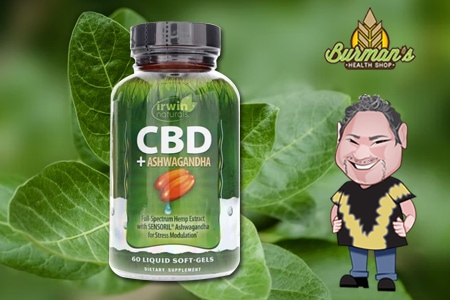Ashwagandha is an evergreen shrub. It primarily grows in Africa, the Middle East, and Asian regions. It has been used as a medicinal agent for years and has numerous potential health benefits. Let’s take a closer look at what makes this magical herb so special.
Sources of Ashwagandha
Ashwagandha is primarily consumed in the form of tea. It is a member of the nightshade family and has close botanical relations to peppers, tomatoes, eggplants, and potatoes. The Ashwagandha plant has a small flower and orange fruit that turns red when ripe. It’s mainly cultivated in sub-continental regions like India and Pakistan.
Top 3 CBD + Ashwagandha Products
Ashwagandha products are readily available in supplements and soft gels. Tulsi Ashwagandha tea, Ashwagandha, and Delta-8 products are most popular among those who prefer herbal medicines. Here are the top three Ashwagandha products to look for.
1.CBD Plus Ashwagandha Liquid Softgel
This stress-relieving softgel is excellent for cortisol control. Along with full-spectrum CBD, the softgel also contains patented Bioperine that helps with better absorption.
2. CBD and Ashwagandha Tea
If you’re a tea lover, you’ll especially love the Tulsi Ashwagandha compounds found in CBD Buddha Teas. These teas are available in a variety of flavors, including Chamomile, Tulsi Ashwagandha, and Matcha Green. They also contain absorption-enhancing CBD nanoparticles.
3. Ashwagandha KSM-66
Ashwagandha KSM-66 has adaptogen properties, so they are ideal for anxiety relief and management of your stress and sugar levels. Ashwagandha can also lower blood pressure and benefit your sex life by raising your libido. Additionally, bodybuilders can use the KSM-66 for muscle strength and testosterone support.
Other Names for Ashwagandha
The scientific name for Ashwagandha is ‘Withania Somnifera’. Some other common names for this plant are Poison Gooseberry, Winter Cherry, and Indian Ginseng. The word ‘Ashwagandha’ itself has Sanskrit origins, and it means ‘smell of the horse’. It refers to the scent of the herb and its ability to enhance strength.
Important Chemical Constituents of Ashwagandha
Ashwagandha contains a variety of chemicals and organic compounds. These chemical constituents include:
- Saponins
- Steroidal Lactones
- Alkaloids
- Choline
- Iron
Benefits and Traditional Uses of Ashwagandha
Over the years, Ashwagandha has been found to induce the following potential health benefits:
- Strength
- Sleep
- Anxiety Management
- Stress Relief
- Blood Pressure Control
Let’s take a look at some of the other benefits and traditional uses of Ashwagandha.
- Fights Cancer-Causing Free Radicals
Ashwagandha has both antioxidant and anti-tumor properties. This equips the plant to fight tumor-causing radicals inside of the body. Furthermore, Ashwagandha can prevent any tumor build-up and strengthen the immune system. It can also support the body against harmful effects of chemotherapy and lead to a quicker post-treatment recovery.
- Memory-Boosting Properties
Ashwagandha essential oils are suggested to support cognitive brain cells. Hence, it’s a potential memory-booster and may help to stimulate an individual’s intellectual powers.
- Anti-Depression and Stress Relief
Ashwagandha may also have favorable effects on the endocrine system, which allows a person to fight stress and related adverse effects on the body. The fact that it supports cortisol level control explains its ability to reduce:
- Stress
- Anxiety
- Weakness
- Fatigue
- Mental Exhaustion
- Anger Issues
- Emotional Weight Gain
Ashwagandha has various traditional uses, from medicinal to medical. It has grown commercially in many parts of India, but used differently by other countries.
Natives of Cape Verde grow Ashwagandha for blood purification and gonorrhea treatment purposes. Ethiopians use it to treat epilepsy and cough. Citizens of Madagascar rely on Ashwagandha to treat asthma-related symptoms.
Another great use of Ashwagandha (as a purgative and diuretic) is for treatment of the liver.
Ashwagandha Parts and Its Health Benefits
Each part of the Ashwagandha plant has various benefits. Each part can be used to treat a wide range of health issues. Whether it’s enhancing your metabolism or stabilizing mental health conditions, the following parts of the plant can help further your goals.
- Berries
Ashwagandha berries are mainly used as an Emetic, meaning that they are ideal for ingestion relief. It helps individuals improve their digestive conditions by clearing the digestive tract.
- Leaves
Ashwagandha leaves are used to prepare blood-purification tonics. The leaves can benefit your weight loss journey thanks to their adaptogen and digest tract relief properties. The leaves are also helpful in treating pain, swellings, and fevers.
- Roots
Do your children have nightmares while sleeping? Ashwagandha roots may help get rid of that problem. In many parts of Somalia, Ashwagandha roots are perceived as an effective remedy for mental problems in adults as well as children.
Ashwagandha and Diabetes Mellitus
Among most health problems, diabetes is a prominent issue that Ashwagandha can help treat. The herb may have abilities to reduce diabetic levels and keep them within a controllable range. It may even improve insulin sensitivity and help control insulin levels.
Ashwagandha and Parkinson’s Disease
Ashwagandha is helpful in treating brain-related disorders like Parkinson’s disease and Alzheimer’s disease. It’s capable of doing so as the herb can reduce oxidative stress and help modulate immunity. As a result, it may also improve cognitive abilities and fight aging symptoms.
Recommended Dosage of Ashwagandha
Here is a summary of recommended Ashwagandha dosages:
- To reduce anxiety: 500 to 600 mg for up to 12 weeks
- To lower blood sugar levels: 250 mg per day
- To enhance male fertility: Five grams per day
- To improve muscle mass: Up to 500mg per day
Side Effects and Precautions While Using Ashwagandha
Ashwagandha doesn’t have any severe side effects, but there are some of the known side effects that users should be mindful of:
- Drowsiness
- Inflammation
- Stomach Aches
- Rising Body Temperatures
Expectant and breastfeeding mothers should avoid Ashwagandha. Experts recommend that people suffering from autoimmune diseases (e.g., lupus and rheumatoid arthritis) should also do the same. When taking thyroid and blood pressure medication, the ingredient can negatively interact with both prescriptions. That’s why it is best to use Ashwagandha under the supervision of a medical expert when taking other medication.
Ashwagandha: The Herb with Many Science-Backed Benefits
Ashwagandha has a wide range of potential health benefits, from stress and anxiety relief to control of your sugar levels. Having Ashwagandha in combination with CBD can help individuals relieve multiple fundamental health problems.
Frequently Asked Questions
Can Ashwagandha help in losing body weight?
Yes. The antioxidant properties in Ashwagandha can help individuals reduce body weight.
Is Ashwagandha helpful in curing cancer?
With its ability to reduce tumor cell proliferation, Ashwagandha may be helpful in curing certain cancer symptoms. It can also reduce harmful effects of chemotherapy and lead to a quicker recovery after treatment.
Can Ashwagandha cure the thyroid problem?
Possibly. By producing more T4 hormones, Ashwagandha can help stimulate thyroid glands and aid in reduction of thyroid-related issues.
Disclaimer:
The statements made regarding these products have not been evaluated by the Food and Drug Administration. The efficacy of these products has not been confirmed by FDA-approved research. These products are not intended to diagnose, treat, cure or prevent any disease. All information presented here is not meant as a substitute for or alternative to information from health care practitioners. Please consult your health care professional about potential interactions or other possible complications before using any product. The Federal Food, Drug and Cosmetic Act requires this notice.



